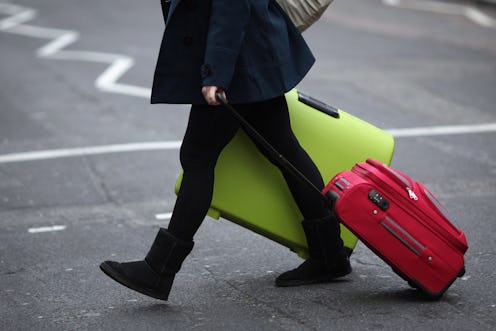News
How Irish Travelers Are Protesting The Country's Abortion Ban This Christmas

The artsy "here's my luggage waiting to take a journey" photograph is, by now, a tried and true tradition for holiday travelers on Instagram or Twitter. But what if your luggage-in-transit snap could send a powerful political statement about women's reproductive rights? For many travelers en route to or from Ireland this holiday season, they can and they are. For its latest campaign, an abortion rights advocacy group is encouraging holiday travelers to use "Healthcare Not Airfare" luggage tags to make a statement about abortion rights in Ireland.
To raise awareness about the journey Irish women must make to obtain an abortion, the London-Irish Abortion Rights Campaign designed an eye-catching white luggage tag with a simple message: Healthcare not airfare. Under the Eighth Amendment of the Irish Constitution, which was introduced in 1983, abortions are banned in all cases except those where a women's life is endangered by pregnancy. The law gives pregnant women and fetuses "equal right to life." It constitutes one of the strictest abortion laws in Europe, forcing women in Ireland to travel abroad if they wish to obtain an abortion.
"Eleven women a day travel from Ireland to Britain a year to access abortion," Cara Sanquest, a spokesperson for the London-Irish Abortion Rights Campaign, tells Bustle in an email. "It is estimated that a further three women a day take illegal abortion pills at home. These luggage tags aim to highlight these journeys that women are forced to make."
Sanquest wrote that along with raising awareness and support for repealing Ireland's restrictive abortion law, the organization aims to give supporters a means of showing solidarity with every women forced to travel overseas for access to the procedure. And it seems there's more than a few travelers eager to show their support and help get the message out this holiday travel season.
The London-Irish Abortion Rights Campaign sold 250 of the luggage tags in the first 48 hours after their release, according to Sanquest. The organization has since sold more than 700 tags, and are still receiving orders for more. In an effort to aid other abortion rights organizations, all proceeds from sales of the luggage tags are being donated to Terminations for Medical Reasons (TFMR), a campaign and support group for those forced by Ireland's strict laws to travel abroad for an abortion or continue a pregnancy against their will after receiving a diagnosis of a fatal or severe fetal anomaly.
The timing of the luggage tags' release isn't coincidental, either. Ireland is set to hold a referendum in the first half of 2018 on whether its strict abortion law should be repealed or relaxed. "This is our last Christmas at home before the referendum in May and we wanted to encourage people to use the opportunity of seeing friends and family to talk to them about how they will be voting," Sanquest tells Bustle. As the holidays are often some of the busiest travel days of the year, the luggage tags will likely have a substantial number of eyes on them.
The luggage tags also are part of a larger campaign, the London-Irish Abortion Rights Campaign's second-annual #Choice4Xmas, which is set to run through Dec. 30. It seeks to raise awareness and encourage conversations about abortion rights ahead of the referendum. While it's still too soon to say how Irish voters will choose, recent opinion polls show growing support for changing the Eighth Amendment. In an Irish Times/Ipsos MRBI poll released earlier this month, 62 percent of respondents said they'd vote in favor of changing the Constitution, while just 26 percent said they opposed a change.
"There is a massive groundswell of support for changing our laws, and we're looking forward to Irish people having their say in May," Sanquest tells Bustle. "No one under the age of 50 has had a chance to vote on this, and it is high time we stopped ignoring the fact that women are exiled to another country in order to access basic healthcare. We need to provide compassionate healthcare for women at home."